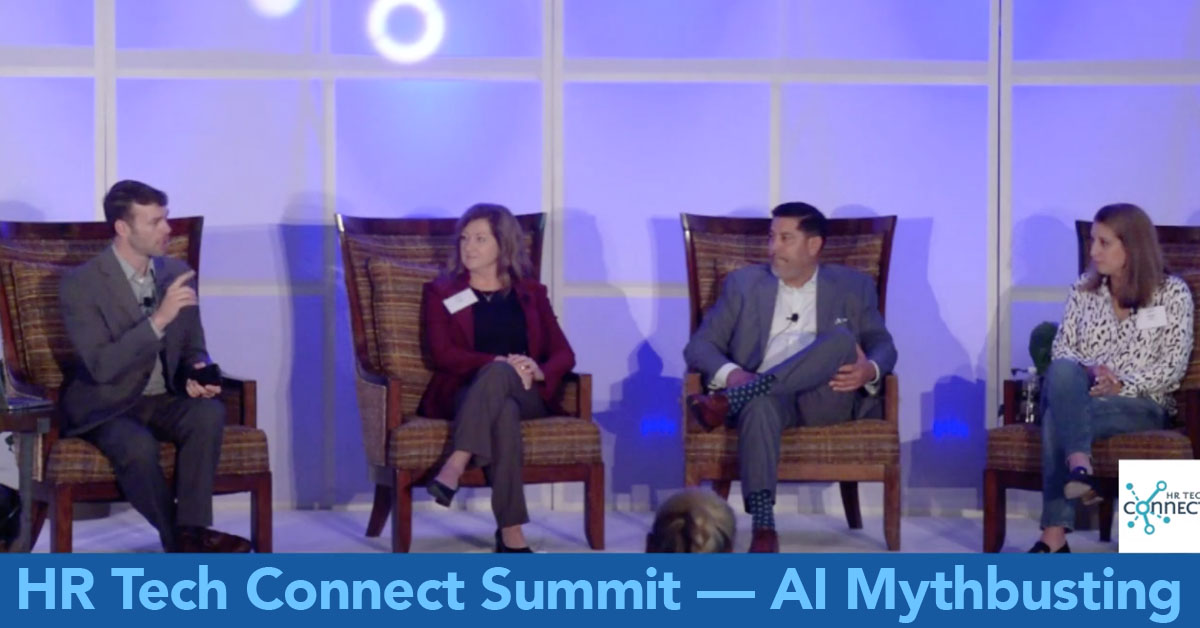Despite knowing the basics of how AI works and what it can do, myths still abound surrounding AI and how it is used in HR. The topic was explored in a panel discussion hosted by HR Analyst Ben Eubanks, of Lighthouse Research and Advisory, called “AI Mythbusting” at the HR Tech Connect Summit last week.
The panel of experts consisting of Teresa Smith, Senior Manager and HCM Strategic Advisor at UKG, Terry Bustamante, Sales Director at DaXtra Technologies and Melissa Swisher, Chief Revenue Officer at Socrates AI, discussed the myths and realities of what AI can do for a company to create better-hiring practices, foster employee development and enhance the employee experience.
What are the best opportunities AI provides HR?
Don’t be intimidated by AI. Instead, be on board and embrace it. Everything HR represents is about the human aspect. AI helps garnish extra time to do this, allowing for time needed to get back to a more human experience.
“There are a lot of menial tasks that recruiters are locked down with. It's time to start automating these tasks so the recruiter can actually do what they’re good at — engaging with people.” — Terry Bustamante
AI helping achieve a more human experience? It’s almost a paradox, but true. By alleviating rote responsibilities, we are given the luxury of time. The added time allows us to be able to interact with others in a meaningful way.
One thing companies struggle with is understanding their employees — what's going on with them, how they're feeling and what they're thinking.
How can you use AI to help serve employees?
“Many things have changed. People are going through a lot of stress. We need an understanding of what is going on with employees and gaining insight into what they are feeling and going through, then taking action on it.” — Melissa Swisher
Actions could be in the form of offering flexibility to accommodate the needs of people. People are looking for this flexibility.
Another solution encouraged is promoting from within the company. AI allows for this by being able to search for internal talent directly through your ATS or CRM, pulling from your local talent pools.
We need to be aware of the growing rates of people leaving companies and changing jobs. A litmus test of sorts, AI can gain insights on how employees feel and offer resolutions and give incentives like flexibility and growth within the company.
The problem of bias in hiring
The important topic of bias was next discussed. In sourcing and hiring this comes into play when HR is faced with resumes that include information like names, dates, companies and affiliations that can trigger unconscious bias.
AI allows for skills-based hiring to take place. Search terms are restricted to skills and qualifications, taking other criteria out of the picture. Candidates are not “seen” for being male or female, black or white, or this ethnicity or that. They are seen for their skills, the level of those skills and their qualifications for the job. Automated intelligence matches candidates-to-jobs, jobs-to-candidates and even candidates-to-candidates, in this fashion.
Then automation comes into play pulling resumes in and again, anonymizing them by redacting the information that triggers bias. This allows the hiring manager to choose from among those candidate resumes based on skill and qualification and not let any other factors influence a decision.
Of course, HR managers will ultimately be faced with speaking with and interviewing a live candidate at some point, but a non-biased first impression has been made in the initial first-point-of-contact stage. And this is significant.
Building a better culture
People leave when they feel they are not a part of a culture. How does AI enhance company culture?
It’s through AI that we can gain insights that help humanize our workforces. We need to instill a feeling of togetherness through company culture to drive people forward and give them a greater experience. Whether it is recruiting or retaining. It’s our people, our employees, who determine the reputation of our companies. These people also influence those looking into joining our organizations.
“Our front line workers need their voices heard. People want to feel valued. Hearing the voice of every employee so that they feel valued is important. We need to take that data insight and build it into our culture.” — Melissa Swisher
Conclusion
There is a perception that AI and machine learning is going to take over the world. But in reality, it is here to augment.
“AI is here to be an extension of who we are and to help us perform our jobs, better. It’s here give us greater insights into the people who are driving our businesses forward.” — Teresa Smith
If we embrace this perspective and shift gears, it can help us to focus and free up our time to create programs for people and learn about their interests and passions outside of the organization.
We can then bring those talents and that passion and interest into the fold to improve our organization.
“We need to be able to take data and insights and marry them with human insights to drive results and create an experience where people truly do want to come to work every day and feel valued. And instill a feeling of trust.” — Teresa Smith
For more information on how DaXtra's intelligent AI solutions can help streamline your HR workflows sourcing processes, download our product brochure.



